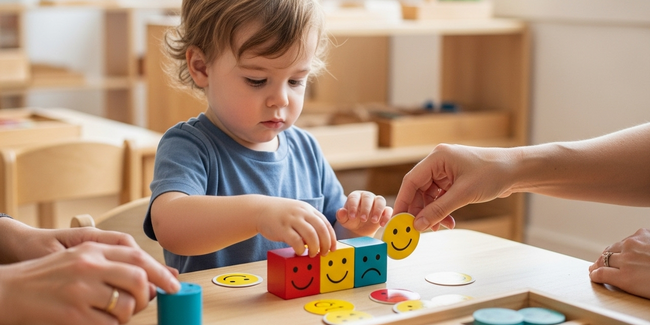For a toddler, feelings aren’t just feelings; they are an entire inner weather system. One moment can be bright sunshine and laughter, the next a sudden, overwhelming thunderstorm of frustration or sadness. As a parent, navigating this unpredictable climate can be deeply challenging, often leaving you wondering, “Is this behaviour normal?” and “Am I doing enough to guide them?”
What if the answer wasn’t in complex strategies, but in the simple, profound act of play? For over 15 years, our experience in elite childcare management has consistently shown us a fundamental truth: play is not a distraction from big emotions. It is the very language toddlers use to process, understand, and eventually master their emotional world.
This article moves beyond simple lists of activities. It offers the guidance other centres won’t: a developmental roadmap grounded in the science of early childhood and aligned with Australia’s National Quality Framework. We will explore how intentional, joyful play builds the foundation for lifelong emotional intelligence, one block, one story, and one shared smile at a time. This isn’t just about keeping children busy; it’s about building resilient, empathetic, and emotionally healthy human beings.
The Foundation: Why Play is the Ultimate Emotional Teacher
Before diving into activities, it’s crucial to understand why play is so powerful. When a toddler engages in authentic, child-led play, they aren’t just having fun. They are conducting complex neurological work. They build and strengthen neural pathways for problem-solving, social negotiation, and emotional regulation.
This principle is so vital that it forms the bedrock of Australia’s Early Years Learning Framework (EYLF), guiding every high-quality centre, including ours. The EYLF’s vision for children to experience “Belonging, Being, and Becoming” is directly nurtured through play. Through play, children learn who they are (Being), how they connect to others (Belonging), and what they can achieve (Becoming).
At Okinja Early Learning Centre & Kindergarten, we see our role as developmental facilitators, creating an environment where this essential work can flourish. To empower you at home, we’ve structured this guide along a clear developmental pathway that mirrors how children learn—a journey through four critical stages: Recognising, Expressing, Regulating, and Applying emotions.
Stage One: Recognising Feelings – Giving Names to the Invisible
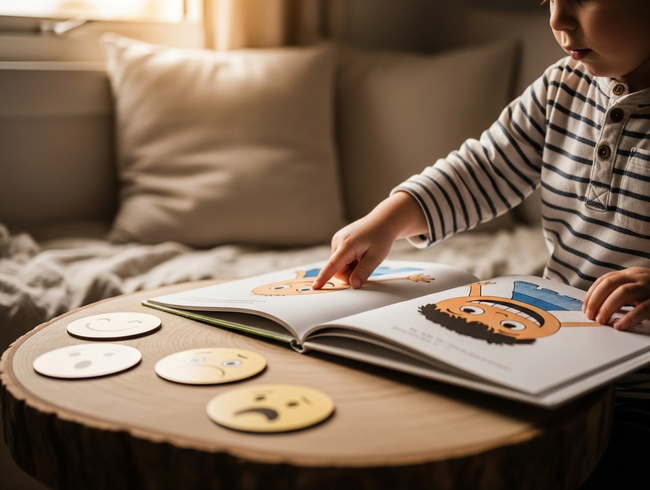
A toddler’s world is one of intense sensations without the words to define them. The hot rush of anger and the bubbly fizz of excitement can feel confusingly similar. The first and most important step is to act as their emotional mirror, helping them connect a name to their internal state. This builds the fundamental vocabulary of emotional literacy.
Play-Based Activities to Foster Recognition:
- Storytelling with Emotion: Reading is one of the most powerful tools for emotional learning. As you read, pause and talk about the characters’ feelings. Use expressive voices. “Oh, look at the bear’s face. His eyebrows are down, and his mouth is in a frown. I think he feels sad that his friend left.” Using puppets or dolls to act out the story adds another layer, allowing children to safely explore feelings from a distance.
- The Feeling Faces Game: Create simple cards with drawings of happy, sad, angry, and surprised faces. You can hold one up and make the face yourself, encouraging your toddler to copy you. “This is my surprised face! Can you make a surprised face?” You can also point to the faces during the day. “You’re smiling so big while you build that tower! You look like the happy face!” This creates a simple, fun, and repetitive link between the feeling, the word, and the physical expression.
Our Philosophy in Practice:
A responsive learning environment is critical for this stage. This is why our emergent curriculum at Okinja is so powerful. It’s a curriculum that breathes with the children. Our highly qualified educators are trained to observe these fleeting emotional moments and use them as teachable opportunities, weaving emotional literacy into the natural, authentic flow of a child’s play, rather than imposing a rigid lesson plan.
Stage Two: Expressing Feelings – Creating Safe Harbours for Big Emotions
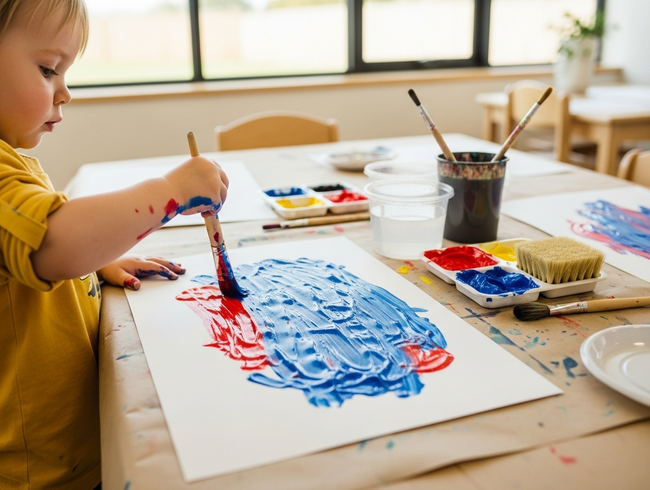
Once a child begins to recognise their feelings, they need safe and constructive ways to express them. The common parental search for “how to deal with toddler tantrums” stems from this crucial stage. A tantrum is often just a raw, unfiltered expression of an emotion too big for a toddler’s developing brain to handle. Our role isn’t to stop the feeling, but to guide the expression. All feelings are valid; not all behaviours are helpful.
Play-Based Activities for Healthy Expression:
- Art as an Outlet: Provide large sheets of paper and chunky crayons, paint, or even playdough. Instead of giving instructions, offer an invitation. “You seem to have some big, angry feelings right now. Let’s see what angry looks like on the paper.” Fast, hard scribbles or pounding playdough can be a wonderfully safe and physical release for frustration, helping externalise the feeling without harming anyone or anything.
- The “Big Roar” and the “Quiet Squeeze”: Channel physical energy constructively. For big, explosive feelings, you might say, “Let’s go outside and roar like the biggest lions!” This gives permission for a loud, powerful release. For feelings of frustration or anxiety, sensory input can help. “It looks like your body needs a big squeeze. Let’s give this cushion the tightest hug we can!” This provides deep pressure, which has a calming effect on the nervous system.
Our Philosophy in Practice:
We embrace the Reggio Emilia-inspired principle that the environment is the “third teacher.” This means every space is intentionally designed to support a child’s needs. Our four separate, purpose-built playgrounds and natural indoor spaces offer a rich tapestry of sensory experiences. This variety provides children with the outlets they need to express themselves constructively, whether it’s through vigorous physical play in our spacious outdoor areas or focused, creative work in a quiet art corner.
Stage Three: Regulating Feelings – The Journey from Co-Regulation to Self-Regulation
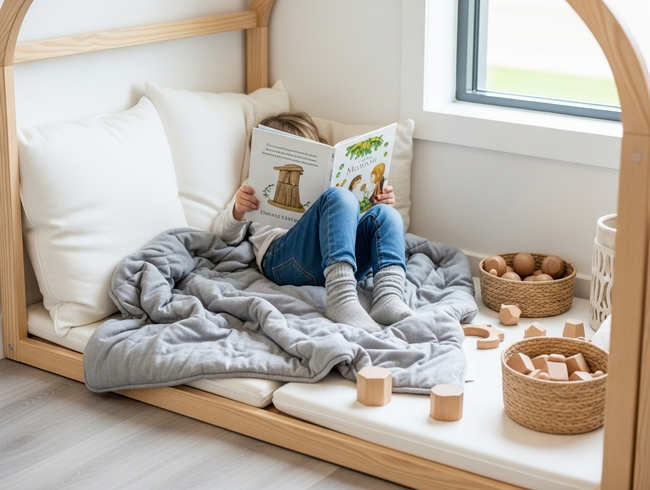
This is perhaps the most challenging and vital stage. A toddler’s brain simply does not have the developed prefrontal cortex required for self-regulation. They cannot calm themselves down from a state of high emotion. They learn to regulate by “borrowing” our calm. This process, known as co-regulation, is the foundation of self-regulation later in life. Our calm, steady presence in their emotional storm is the most important tool we have.
This directly reflects the focus of ACECQA’s National Quality Standard, Quality Area 5: Relationships with Children. This standard recognises that secure, respectful, and reciprocal relationships are the absolute cornerstone of a child’s wellbeing and development. It is through these trusted relationships that co-regulation happens.
Play-Based Activities to Build Regulation Skills:
- Creating a Calm-Down Corner: This is not a “time-out” spot for punishment, but a safe, cosy haven a child can choose to go to when they feel overwhelmed. Fill a small tent or a corner with soft pillows, a weighted blanket, some quiet sensory toys, and a few favourite books. Introduce it during a calm moment. “This is our cosy corner. When your feelings feel too big, you can come here to feel safe and calm.”
- Breathing Buddies: This simple mindfulness exercise makes breathing tangible. Have your child lie on their back and place a small, beloved stuffed animal on their belly. “Let’s watch Teddy go for a slow ride. Take a big breath in and watch him go up, up, up… and now breathe out and watch him go down, down, down.” This transforms a complex instruction (“take a deep breath”) into a gentle, playful game that physically calms the nervous system.
Our Philosophy in Practice:
The connection between nature and emotional calm is profound and evidence-based. This truth is central to our approach to fostering toddler emotional regulation on the Sunshine Coast. Our unique location, nestled beside the natural tranquility of the beach and Alex Forest Bushland Park, is more than a beautiful backdrop; it is an active and essential extension of our learning environment. A simple, guided walk to listen to the birds or observe the steady, rhythmic crash of the waves can be a more powerful lesson in calm and regulation than any indoor activity.
Stage Four: Applying Feelings – Building the Bridge to Empathy
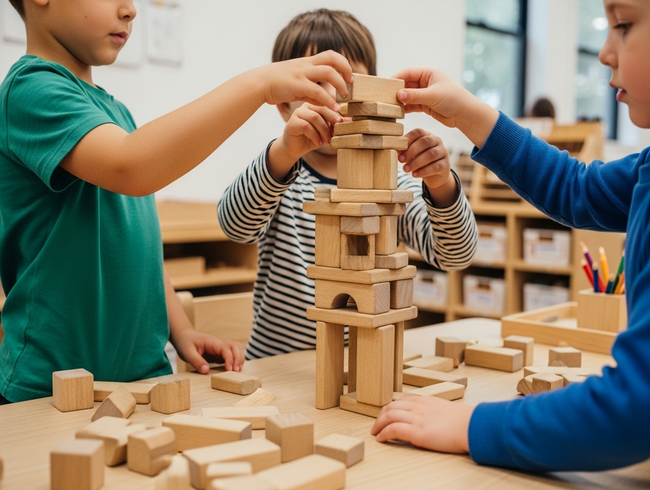
The final stage in this journey is when a child begins to use their emotional understanding to connect with others. This is where emotional intelligence blossoms into social skills like empathy, sharing, and cooperation. They start to recognise feelings in their friends and learn how their actions impact others.
Play-Based Activities for Social and Empathetic Skills:
- Cooperative and Team Construction: Any activity that requires working together towards a common goal is a brilliant lesson in social skills. Building a large fort out of blankets, constructing a massive tower with blocks, or tending to a small garden patch together all require communication, negotiation, compromise, and perspective-taking.
- Role-Playing with Purpose: Use puppets or dolls to act out common social challenges. “Teddy really wants to play with the red car, but Mia is using it. What could Teddy say? How do you think Mia feels?” This allows children to practice tricky social scripts and consider others’ perspectives in a low-stakes, playful context before they face it in the real world.
Our Philosophy in Practice:
This focus on social connection is at the heart of the “Belonging” aspect of the Early Years Learning Framework. At Okinja, we intentionally foster a community where children learn alongside and from one another. Our educators are not just supervisors; they are skilled facilitators who gently guide these social interactions. They help children find the words they need, understand a friend’s point of view, and celebrate collective achievements, building the foundations of empathy, kindness, and collaboration that will serve them for their entire lives.
Your Partner on the Emotional Journey
Guiding a toddler through their complex emotional world is one of the most important roles a parent or caregiver will ever have. By embracing play as the powerful, purposeful work of childhood, you can provide the tools they need not just to ride their emotional waves, but to become confident, capable navigators of their own hearts. This journey requires patience, connection, and a deep trust in the developmental process.
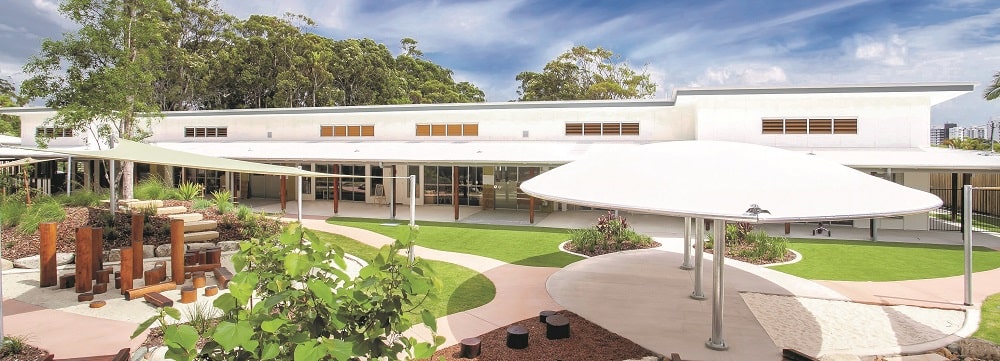
This is the expert, evidence-based, and nurturing philosophy that drives everything we do. We are committed to translating the highest standards of early childhood education into joyful, authentic experiences that honour the whole child.
The best way to understand the power of our play-based philosophy is to see the joy and deep learning it sparks in person. We invite you to book a tour to see how our expert educators intentionally design experiences that turn a child’s natural curiosity into a foundation for lifelong learning. You’ll see how our thoughtful indoor spaces and enriching outdoor areas work together to support this powerful approach. Contact Okinja ELC on 07 5479 2222 to arrange your visit.

